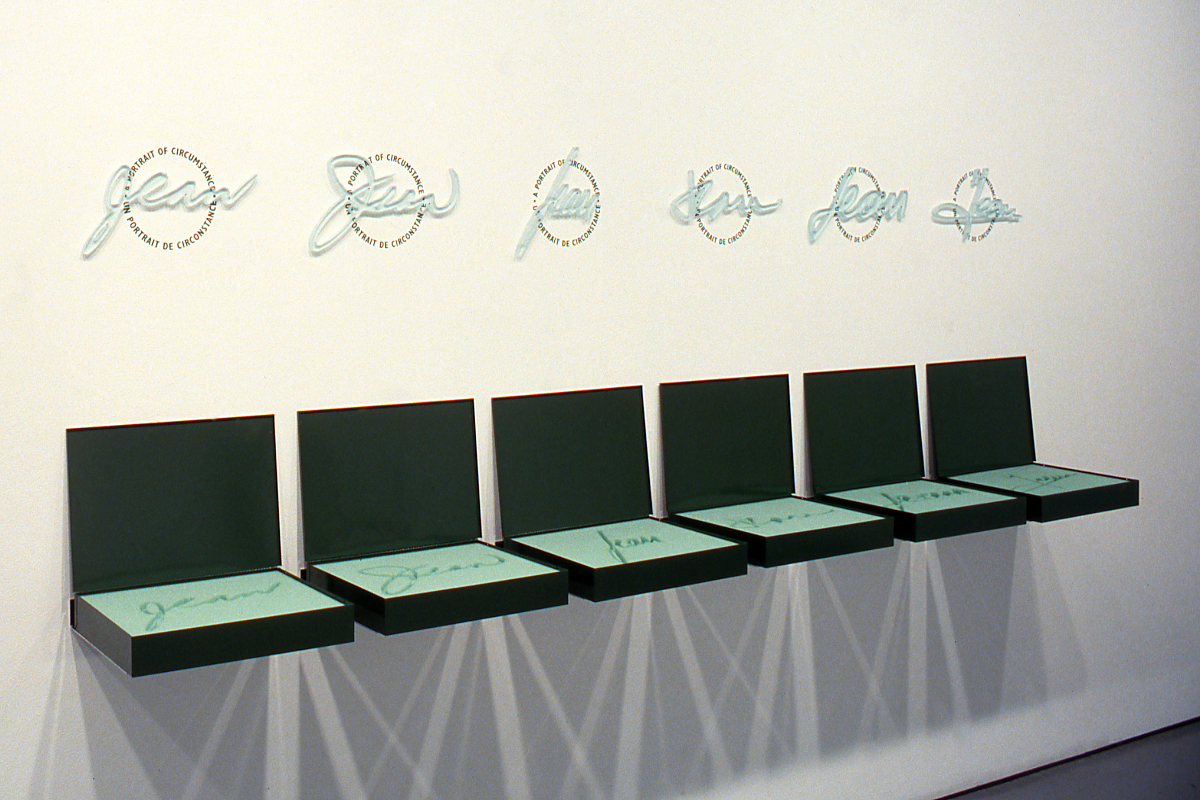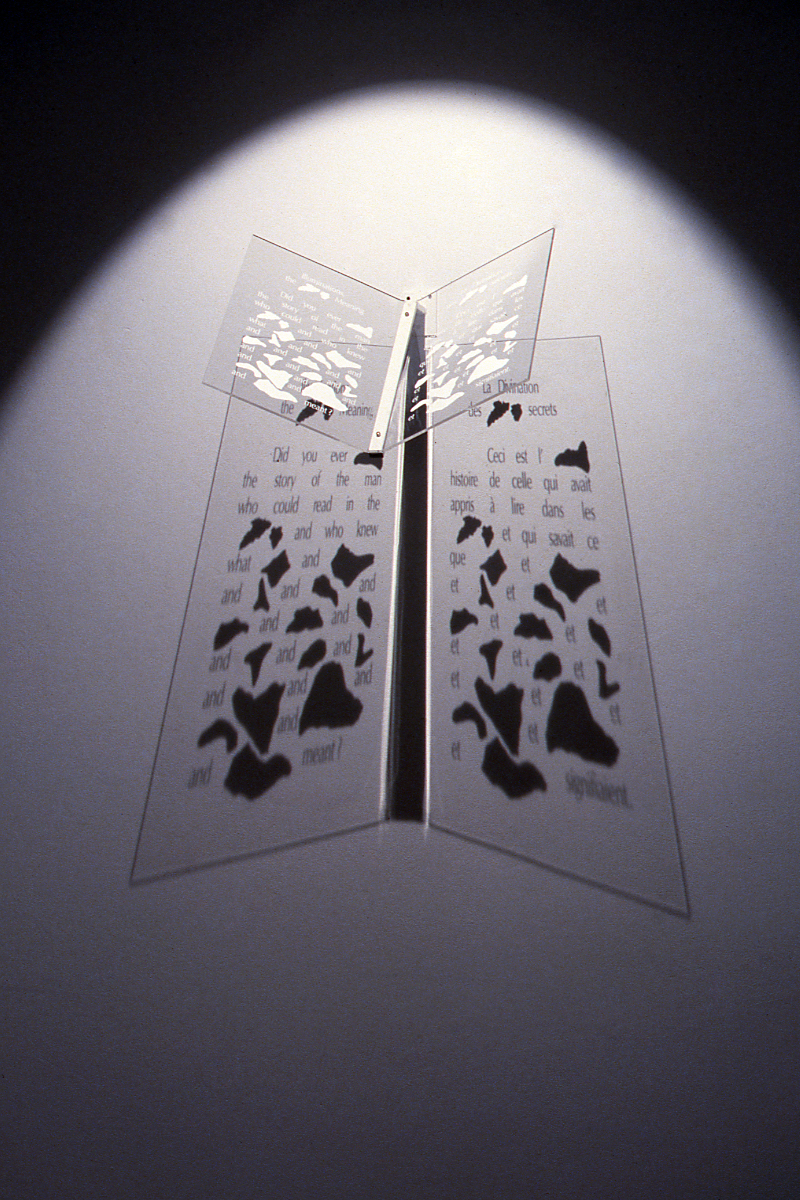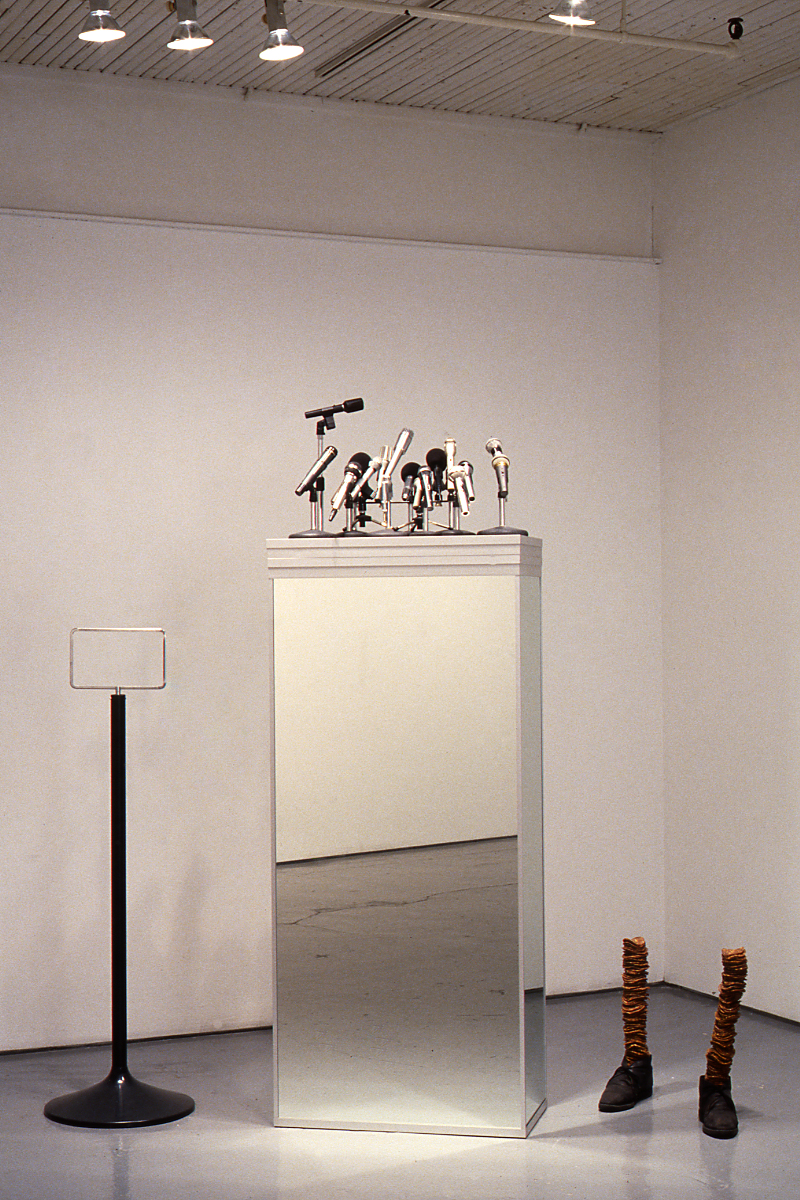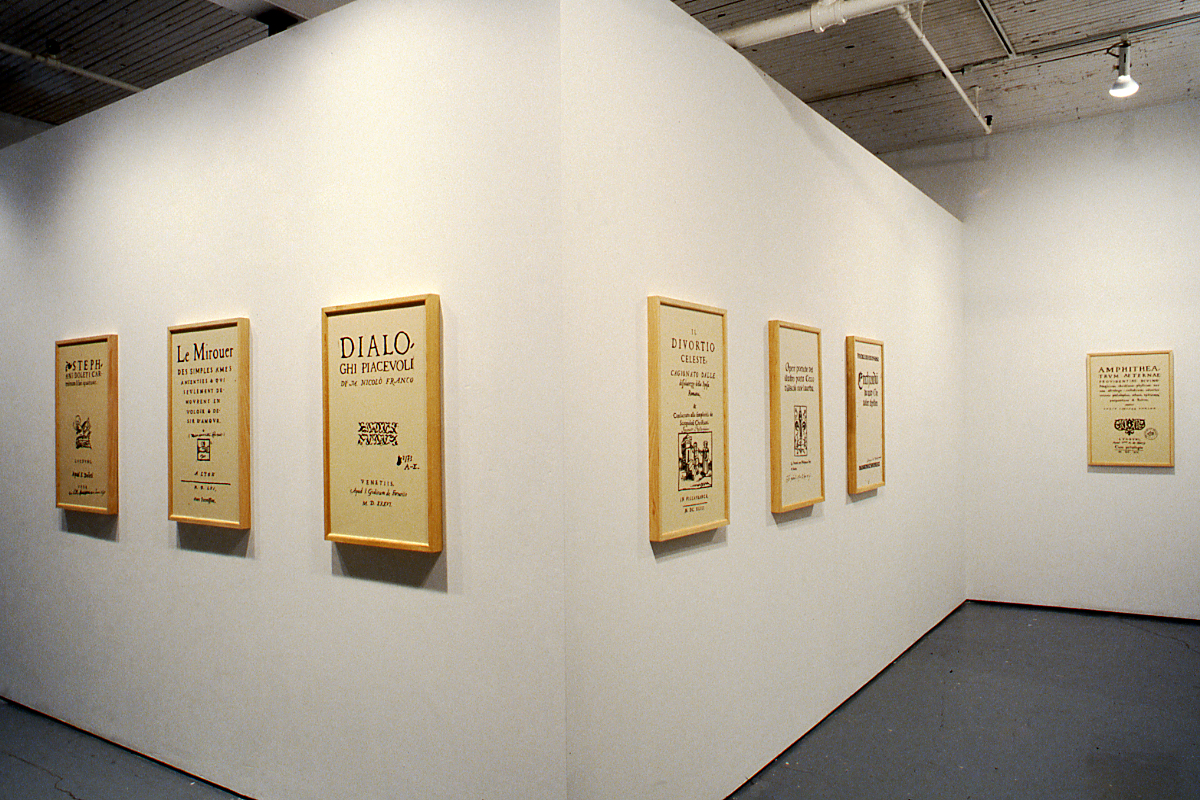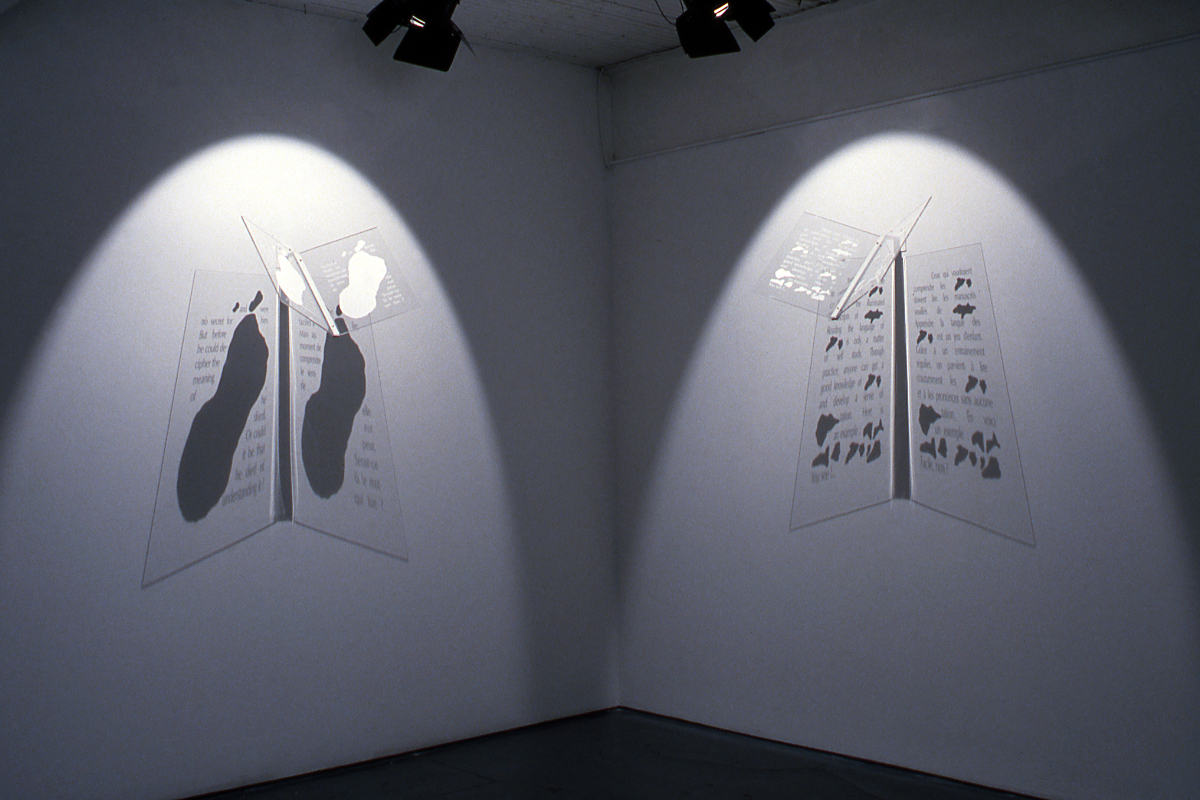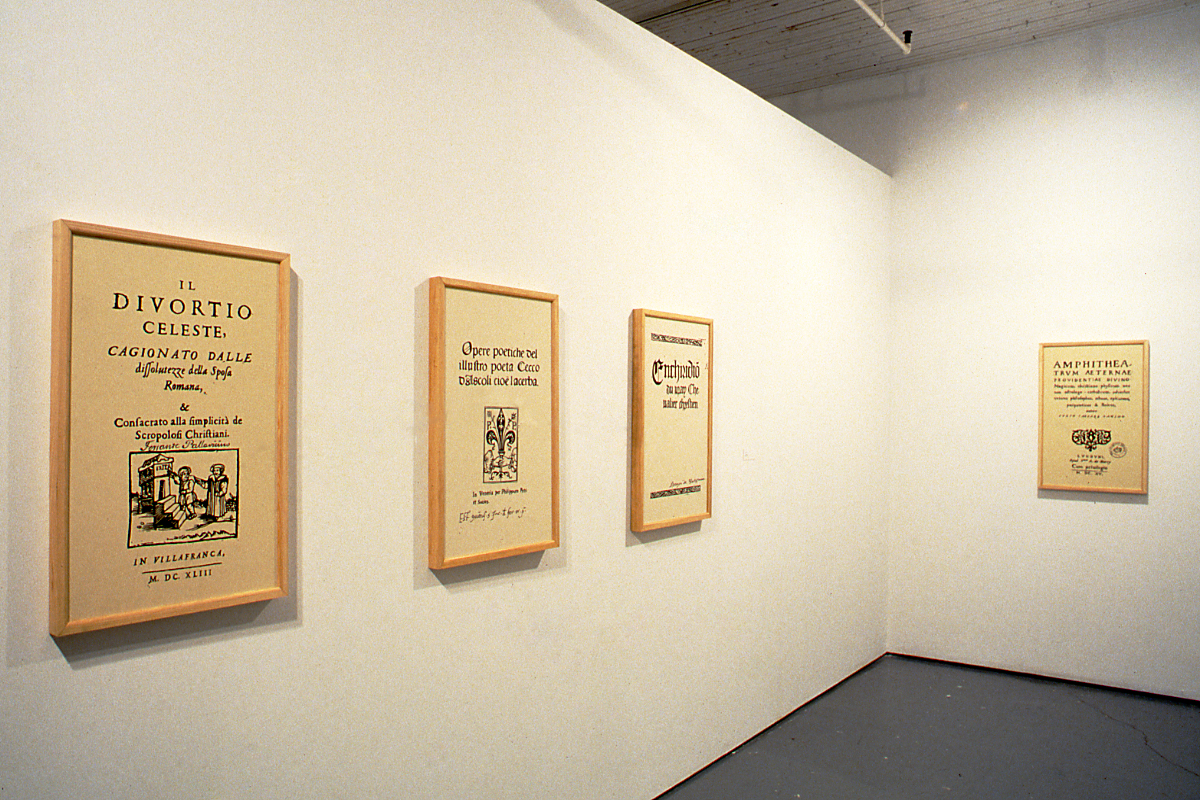Main Gallery:
For Lack of Evidence is a collaborative project between Mercer Union and the Galerie d'Art Contemporain, Herblay, France. This exhibition focuses on an investigation of belief systems and power structures, exploring strategies of critique and ultimately the configuration of social mechanisms. Toronto artists Micah Lexier, Louise Noguchi and Brian Scott, as well as Paris artists, Martine Neddam, Michel Paysant and the collective, Taroop & Glabel, question prevailing perceptions of collective order, "objective" knowledge and mass culture identities.
In essays for the accompanying catalogue, Barbara Fischer and Rosi Huhn, describe the condition of displacement upon which the works arrive:
Catalogue Text:
FOR LACK OF EVIDENCE: LES CAHIERS DES REGARDS
Published by Mercer Union and the Centre d'Art Contemporain, France, 1993
CYBERNATION
Barbara Fischer
1. The Natural Machine
The idea of a "lack of evidence," suggests an aspect of our contemporary condition. For as a lack of something that can be made to be seen~, the condition of a non visualisable world (or a field that cannot yet be visualised) is inherent to modern "electronic" technology, the specific culture it produces, and the ubiquitous process of "cybernation". Marshall McLuhan once pointed to an invisibility, or lack of visible evidence, with regard to contemporary culture in this way:
"Nowadays, with computers and electric programming, the means of storing and moving information becomes less and less visual and mechanical, while increasingly integral and organic. The total field created by the instantaneous electric forms cannot be visualised any more than the velocities of electronic particles can be visualised."³
If indeed, the "lack of evidence" refers to an invisible or unrepresentable field of electronic technology, the newly theorized rapturous complexity of the "natural machine", with its unfounding of all fixed points of reference, might then be seen as new evidence. An "organic field" of information processed through electronic technologies is itself an effect of the instantaneity and simultaneity of that process. As McLuhan figured it, in 1964:
"In the age of instant information man ends his job of fragmented specialising and assumes the role of information-gathering. Today information-gathering resumes the inclusive concept of 'culture' ... our quarry now, in this new nomadic and "workless" world, is knowledge and insight into the creative processes of life and society."⁴
The result of electric speed-up in industry at large is the creation of intense sensitivity to the interrelation and interprocess of the whole, so as to call for ever new types or organization and talent. Viewed from the old perspectives of the machine age, this electric network of plants and processes seems brittle and tight. In fact, it is not mechanical, and it does begin to develop the sensitivity and pliability of the human organism. But it also demands the same varied nutrient and nursing as the animal organism.⁵
"Culture"—or, the natural machine—and the perception of its "organic," complex and contradictory condition, therefore, might be seen as but the final frontier of knowledge, and the emerging field of knowledge, in the invisibility of "the virtual phase of technological society."⁶
II. Crash Develpoment and Fall-out⁷
Today, a more myopic view shows that the invisible and heady electronic thought clouds of "cybernation" have, more than ever before, condensed into visible statistics of black-on-white figures of economic growth and decline, or black and bloody red evidence. McLuhan's "nomadic" and "workless" world--even his observation that the increasing convergence of the media of money, writing and clock have brought us "as close to the total involvement of man in his work, as of native in a primitive society, as of artist in his studio"⁸—has been realized in the successes and fall outs of the remote-controlled cd-pc-cyberrevolution of the 1980s. This time-saving revolution has been paid for by brutal down sizing—the massive obsolescence of an industrially-trained work force. Official restructuring, has left those who are not able to become like artists, that is to employ themselves, with no new place to go.
Conversely, within the organic new whole of the information-based society, the movement of organic disorder is ever more rapidly mapped in terms of electronic financial transactions: the old specialisations, and therefore separations of information, have indeed disappeared in the convergence of "money, writing and clock". Individuality is registered in the closed-circuit, instant play-back units of credit banking-card accounts, social insurance numbers, and tele-video phone recording. Dissent is on the side of a lack of purchasing power, and purchasing power is rewarded exponentially, much like success, money, or the crowd: it attracts more of the same, especially if it is evidence piling up on credit card statements.
"Today as new vortices of power are shaped by the instant electric interdependence of all men on this planet, the visual factor in social organization and in personal experience recedes and money begins to be less and less a means of storing or exchanging work and skill. Automation, which is electronic, does not represent physical work so much as programmed knowledge. As work is replaced by the sheer movement of information, money as a store of work merges with the informational forms of credit and credit card. From coin to paper currency, and from currency to credit card there is a steady progression toward commercial exchange as the movement of information itself ."
III. Circumstantial Evidence
If, in art, the vortices of new power were once evident in exhilarated, giddy raps on new-found speed, mobility, proximity, and TV instantaneity, the dazzle has burned to an end as the 1990s are globally shaken into acknowledging and accepting the final rift between an old and a new "world" order. No longer subliminal, the revolution of the 1980s automated war machine has come to a deafening standstill—to an awed contemplation of blasted allegories, with headless and organ-less bodies wandering lost among trails of ruins, entrails adorning the garden-path, stunned eyes rolling without orbit, old Structures standing like smouldering trusses with their meanings vanished into black holes of the past. The allegorical traversing of that landscape, before the dust has completely settled, is a slow picking up of the pieces, the "piecing together" of what's happening—with, as far as I can see, no common strategy. In the works of Canadian artists Louise Noguchi, Brian Scott, and Micah Lexier, there is then but a sampling of circumstantial evidence of the aftermath of this recent revolution. They attest to the effects of the immaterial, unrepresentable field of electronic communication, including the anxious condition of the body and subjectivity, their appearance and disappearance in the virtual reality of the electronic field.
For Lack of Evidence will travel to Paris in the spring of 1994. The catalogue will soon be available. For information on the launch date or for any further information, please contact Mercer Union.
